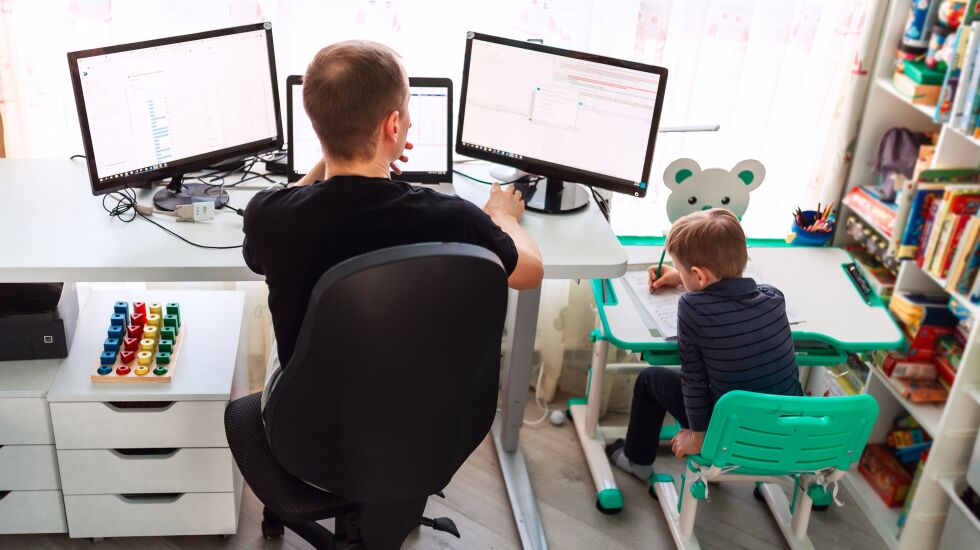
A new study focused on Chicago residents has some interesting findings on the stress experienced by fathers who work remotely and those who work on-site.
The study, titled “Teleworking, Parenting Stress, and the Health of Mothers and Fathers,” was done by researchers at Northwestern University and the Ann & Robert H. Lurie Children’s Hospital. They found that fathers who worked from home experienced a lot more stress than those who worked on-site — but there was no significant difference between mothers who worked remotely versus those who worked on-site.
The study showed that 40% of parents who worked remotely during the pandemic reported higher parenting stress, compared with only 27% of parents who worked on-site. But fathers who worked from home were twice as likely as fathers working on-site to report that parenting was stressful “all or most of the time.”
It’s not exactly clear why working from home added more parental stress to fathers. But the study’s lead author said the finding “might be a reflection of societal expectations that men should prioritize work obligations over family needs, which creates additional stress for fathers working from home.”
Maybe. But I think it may be because for a lot of fathers, working remotely is relatively new, and with change comes stress. Simply put, a lot of fathers are not used to being around their children during work hours.
Because the study results showed that working remotely had more of an impact on fathers than mothers, the authors advised parents to create an arrangement that limits stress and promotes well-being. Something as simple as having a noise-cancelling machine in the home’s work area can help, or rearranging schedules to limit distractions and setting aside time for both parents to step away from work and fully engage with their children.
Setting a schedule creates work/life balance
Since the pandemic, many companies have discovered this benefit: That employees who are happy actually work more and are more productive, which allows businesses to save money on rent and utilities as they downsize their office space.
Of course, there are some jobs that don’t allow for remote work or flexible hours. Most solo attorneys, for instance, cannot take depositions or litigate remotely with maximum effectiveness. Service jobs, such as restaurant staff, and other jobs such as medical workers, factory workers and other occupations, must be done in person. But more and more, our economy is made up of jobs that can be done remotely and at hours that work best for the employee.
But if fathers who work remotely are twice as likely to feel that parenting is stressful all or most of the time, then working remotely doesn’t automatically foster a good work/life balance — the reason most people claim to want to work remotely in the first place.
For those, especially fathers, who want to work remotely, putting together a plan is essential.
Fathers who work remotely should set a daily schedule with periods of uninterrupted time for work or focusing on children’s needs, perhaps by breaking up the day to coincide with school hours. Instead of working straight from 9 a.m. to 6 p.m. like most on-site workers, a father working remotely may find it less stressful to focus on work a couple of hours early in the morning, then get the children fed and off to school, then resume work before taking time to get the children home and help them with homework before wrapping up on work for the day.
Having structure will likely reduce parenting stress and allow fathers more positive interactions with their children — and make them happier, which will in turn make them better workers.
That said, fathers who work remotely should also have some time set aside for the unexpected. Anyone who has kids can attest to this fact: You can’t set a schedule for everything a child needs.
Jeffery M. Leving is an attorney and the recipient of President Joe Biden’s 2023 Presidential Lifetime Achievement Award.
The Sun-Times welcomes letters to the editor and op-eds. See our guidelines.
The views and opinions expressed by contributors are their own and do not necessarily reflect those of the Chicago Sun-Times or any of its affiliates.







